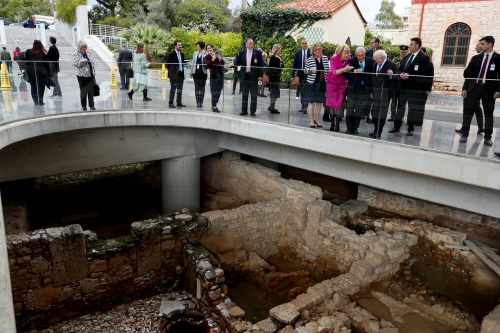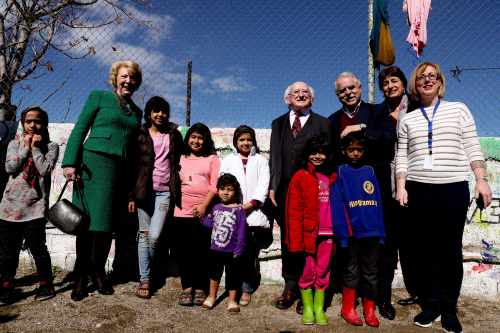Speech by President Higgins at a concert hosted by the Irish Ambassador to Greece
Athens Concert Hall, Megaron Mousikis, Greece, 23 February 2018
A Airí,
A Ambasadóir,
A dhaoine uaisle,
A chairde,
Ar an gcéad dul síos, ba mhaith liom mo bhuíochas a gabháil leat, a Ambasadóir, as d’fhocail deasa. Is mór an ónóir dom é a bheith anseo libh anocht, sa tír álainn, íontach seo. Ba mhaith liom fíor-bhuíochas a gabháil le hUachtarán na Gréige, don Rialtas agus do mhuintir na Gréige, as ucht an fáilte críoiúl a chuirtear romham agus roimh mo bhean chéile, Saidhbhín.
Ministers,
Ambassadors,
Distinguished guests,
Dear friends,
As I have just said in the Irish language, I would like to begin by thanking you, Ambassador, for your kind words. I am honoured to be with you all here tonight, in this beautiful, remarkable country. I would like to express my sincere thanks to the President of the Hellenic Republic, to its Government and to the Greek people, for the heartfelt welcome that has been given to me and to my wife, Sabina, to Minister Doherty, and to our whole Delegation.
We will always cherish the memory of these special days here in Athens.
It gives me such pleasure to see so many of you gathered here this evening in this great hall of music, the Megaron Mousikis, and to stand in this magnificent chamber, named as it is after Dimitris Mitropoulos, a conductor, composer and pianist who is so associated with the performance of modern orchestral music in Greece, Germany and the United States.
He was an internationalist in the very best sense, a champion of that which is universal across all our diverse cultures on this planet: the love of the arts, of the written and spoken word, and above all, of music. This assembly of Greek and Irish talents today is surely a reflection of that spirit.
As many of you will know, this is not my first visit to Greece. Greece holds a special place in my heart, as it does in the hearts and minds of so many Irish people. It is a little over a decade since I last visited Athens. While here, I had the pleasure of reading poetry in the Athens Centre, hosted by the Greek Irish Society.
The connection between our countries is not a recent one, but one that stretches back millennia. Our respective mythologies stand with the Roman, Iranian, Indic, and Norse as the last echoes of the tradition of storytelling of the Heroic Age, when gods and men were said to walk the earth together.
The great French scholar of comparative mythology, Bernard Sergent, has even speculated that our respective mythos arise from the same common culture, so much so that the role of the Irish warrior Cúchulainn as it is depicted in the Táin Bó Cúailnge may be compared with that of Achilles in the Illiad – two divine but tragic soldiers who lost their companions as a result of political machinations.
The works of the great Greek historian of the second-century BC, Polybius, provide us with the first written account of contact between our two countries, instigated by the Greek explorer, Pythias of Massalia, whose own account of his voyages, On the Ocean, is sadly lost to us today.
It was the Greek cartographer of the second-century AD, Claudius Ptolemy, who created the first known map of Ireland, delineating and naming the rivers and promontories, and the clans and their cities. Ptolemy recorded the name of the Island as the same as that of its people, ‘Iverni’, from which the Romans later derived the name ‘Hibernia’, Land of Winter.
To name a place is to bring it into the imaginative universe of a culture. Ireland has existed in the Greek mind, and Greece in the Irish, ever since that first encounter, more than two millennia ago.
Yet, when we in Ireland survey our own political and literary tradition, we may find that Greece and the Greek people have had a far more profound influence on Ireland than Ireland has had on the Greeks.
So many of our literary giants considered themselves philhellenes, and drew from this country their inspiration, not only on the genius of the ancient democracies of Athens and Thebes, the wonders of medieval Greek civilization, or the beauty of the Greek language and landscape in all its forms but on the example of fierce pride and profound culture of the modern Hellenic Republic.
A young Oscar Wilde read Greek ‘eager’, in his words, ‘for the love of it all’. ‘The more I read’, he said, ‘the more I was enthralled’. W.B. Yeats wrote of medieval Byzantium, as a ‘holy city’ which was at once the cynosure of his spiritual philosophy and a reliquary for his soul.
It was James Joyce, whose masters are rightly said to have been Homer and Aristotle, who gave a modernist expression to the epic of the wanderings of Odysseus, whose monumental struggles were re-imagined as the voyage of Leopold Bloom through the city of Dublin.
Joyce’s literary alter ego bears the name of the first Christian martyr, the Greek-speaking Stephen, and the architect of the labyrinth, Daedalus. We in Ireland are indebted to the Irish philosopher Fran O’Rourke for recovering the depth of Joyce’s love for Greece, its language and its people, and I am delighted that Fran has joined us this evening. Indeed, I had the honour just a few days ago of conveying good wishes to Stephen Joyce, grandson of James Joyce, on his 86th birthday, and we spoke of Greece.
Joyce’s philhellenism was shared by Louise MacNeice who, as a poet and playwright, was not only a brilliant interpreter of ancient Greek authors – bringing Homer, Thucydides, Aristophanes, Xenophon, Petronius, Apuleius, and Horace to BBC radio listeners – but an advocate for the Greek people during the dark days of the Second World War. MacNeice wrote a radio-play characteristically entitled The Glory that is Greece, broadcast on BBC on the first anniversary of the day that the Greek people said ‘Ochi’ to the Axis powers, and summoned the voices of veterans of the Greek War of Independence to celebrate the bravery, culture and spirit of the contemporary Greek people, to provide an example to those who sought to oppose fascism.
As Professor Brian Arkins, an eminent Irish classicist, has demonstrated, this tradition of seeking inspiration from both the Greek past and present continues to this day. Modern Irish poets, playwrights and authors such as Seamus Heaney, Michael Longley, Derek Mahon, Colm Tóibín, and of course Marina Carr, as well as Paula Meehan and Theo Dorgan all looking at times to Greece, not only to antiquity but to writers such as Constantine Cavafy, George Seferis, and Odysseus Elytis.
I am so pleased that Paula and Theo have joined us this evening.
In speaking of the modern connection between our two peoples, may I take this opportunity to recognise the work of Richard Pine, whose frequent ‘Letters from Greece’, dispatched from his adopted home Corfu, have been published in the Irish Times over the past years.
They have been a reminder to those of us in Ireland of all that we share with the contemporary Greek nation.
As two nations on the periphery of the continent of Europe we are distant in geography but so close in our common characteristics and historical experiences: a long and unremitting struggle for independence against an imperial power: the challenges of creating a nation-state capable of fulfilling the potential and promise of our independence; and the experience of hardships produced by unsustainable and unjust economic policies, whether sourced in our own countries or in the European Union.
We share a continued commitment to protect and promote our respective cultural patrimony. In December 2017, UNESCO added the traditional Greek music genre of rebetiko its register of Intangible Cultural Heritage. At the same meeting, UNESCO added the traditional Irish music instrument, the uilleann pipes, to the UNESCO Representative List of Intangible Cultural Heritage. At that time, I congratulated those who safeguarded the art of the manufacturing and playing of the uilleann pipes through Ireland’s lean years. Greece deserves the same commendation for the preservation and promotion of its musical culture throughout what have been most difficult years.
It was a reminder that cultures are not confined to any defined national territory, for we are both diasporic and migratory peoples. Because of this experience, we are perhaps more aware then other peoples of the deep moral imperative to welcome all those fleeing war, persecution, famine and natural disasters, and I would like to take this opportunity to recognise the compassion and generosity demonstrated by the Greek people in responding to the plight of those who have sought sanctuary on your shores.
This response reflects the best of the egalitarian traditions of your country - which constitute a vital moral resource for all citizens, not only of Europe but of this planet.
Greece has so often stood on the frontline of the battle for democracy, and for a more just and humane world. You have known what it is to face those who promulgate an extreme version of nationalism, those who would seek to divide us against one another on the grounds of ethnicity, religion or nationality, and who would ignore or even perpetuate inequalities in wealth, income and power. Only forty-five years ago, the students of the Polytechneio, only four kilometers west of where we sit today, became the flag bearers of the struggle against dictatorship. Let us never forget them or their courage.
As we now seek to give a new shape to our European Union, and to craft new solidarities between the European peoples, we would do well by recalling their bravery. Bravery in action, and, let us not forget, bravery in thought. They imagined a radical new vision, and we would be well served by invoking some of the emancipatory vision and spirit of those days, and by bringing such a vision - and such a spirit - into the very centre of our project of European Union.
Dear friends,
It is my special pleasure to welcome here tonight the members of the Greek-Irish Society, which celebrated its fortieth anniversary last year. Community groups such as this embody the relationships between countries, and your continued activity is an important form of diplomacy, in keeping some of the Irish culture alive in Greece.
I met with the Irish Institute of Hellenic Studies at Athens yesterday, which has been facilitating the Irish study of Greece and its culture for over twenty years, particularly through our universities. I was very pleased to receive a copy of their publication, ‘The Lure of Greece’, which documents Irish involvement in Greek culture, history and politics. It is an aptly named book; I too have felt the pull of this magnificent country.
While the rich texture of creative relationships over the decades and centuries is well-established, I have also been delighted to learn of more recent initiatives, including in months to come. Collaborations between Greek and Irish artists, writers, film makers, actors and musicians, from Corfu to Samos to Thessaloniki. A fine example is the Athens Celtic Music festival, entering its fourth year this summer, which many of those entertaining us here tonight are involved in.
We continue this tradition tonight.
I hope that you all enjoy the evening of entertainment that is to follow which, through poetry, music and song, will celebrate our two cultures with echoes of their rich pasts, and promises of all the collaboration that is to come.


